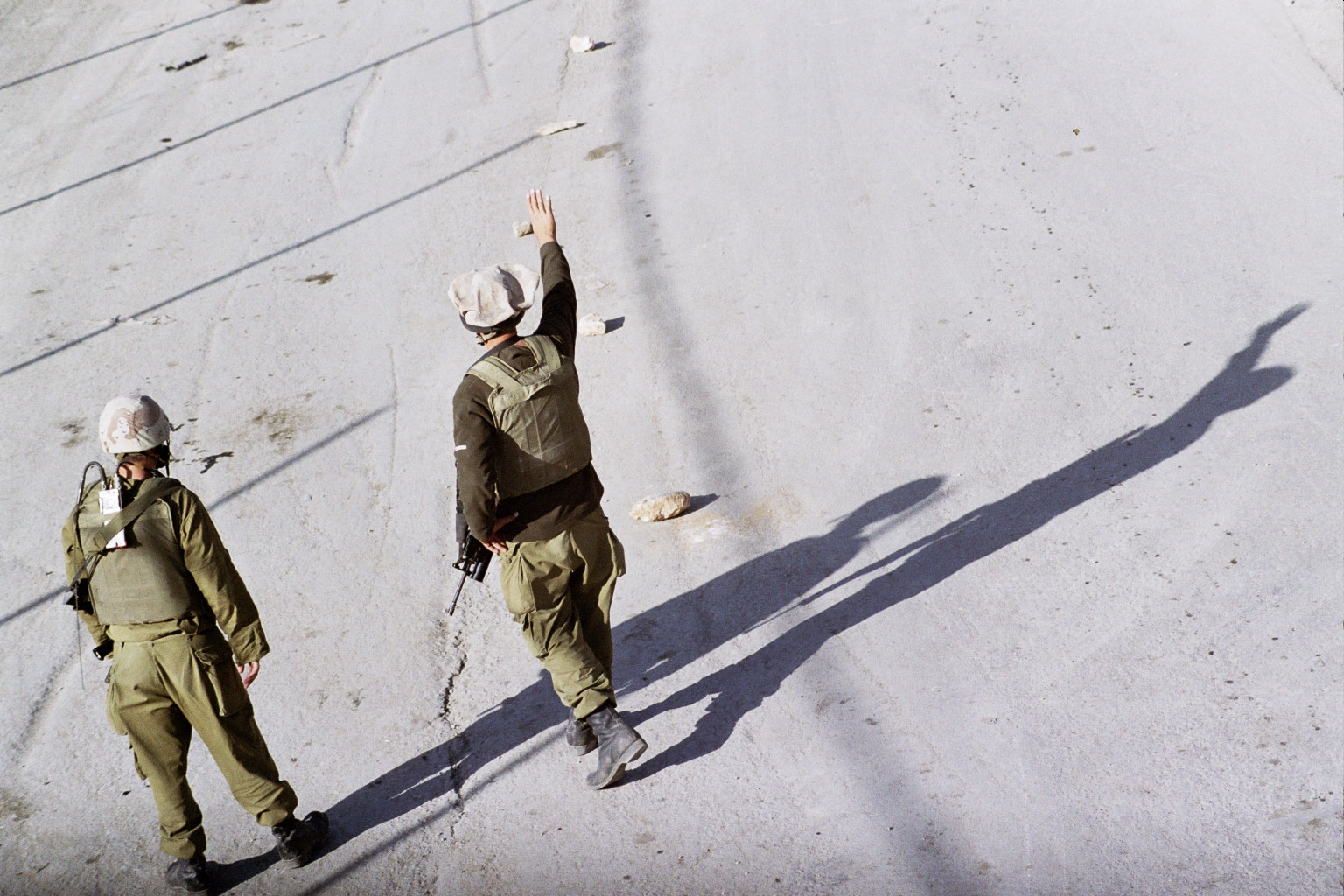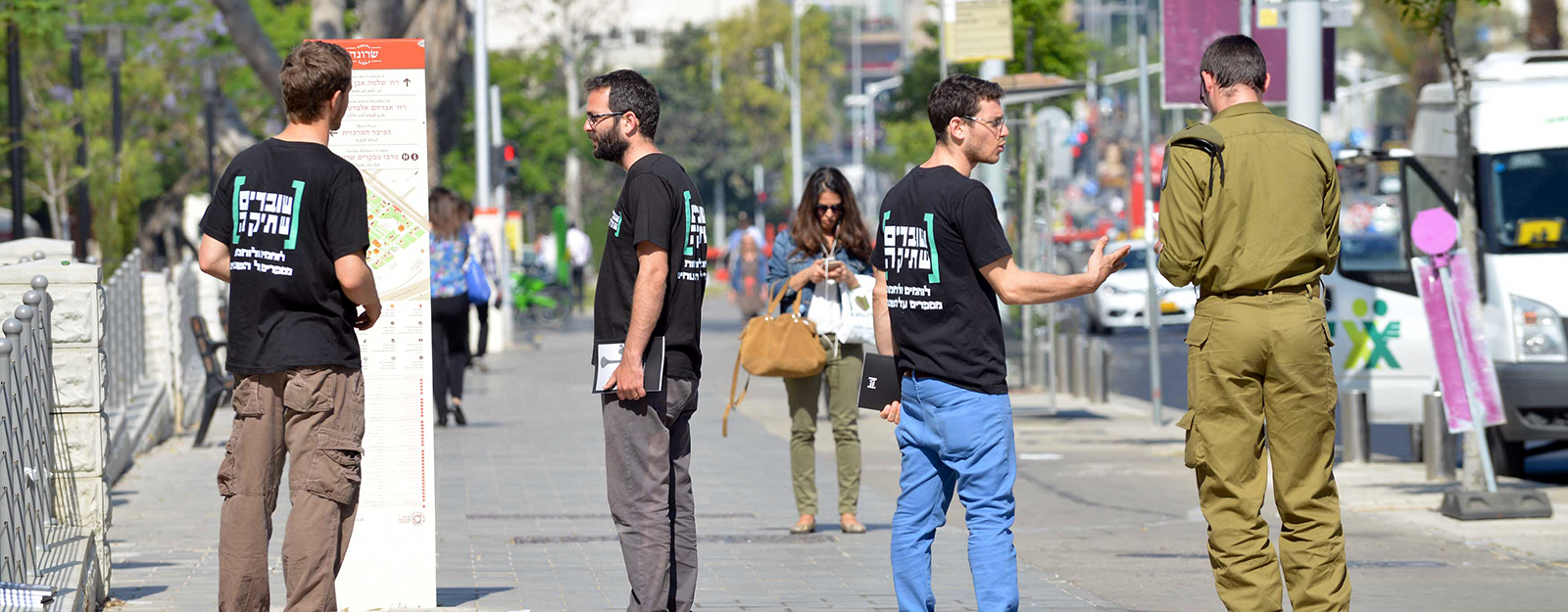I’m trying to understand if in briefings, on the procedural level, if anything was said about what to do if settlers cut down an olive tree, if you are standing next to [Palestinian] shepherds who are fighting [with settlers] – forget who’s attacking whom – if there’s some kind of procedure. I don’t recall there being a procedure. As far as I know, when there’s a problem with a Palestinian, usually it’s to be dealt with by the army, within the military framework. [But] a soldier can’t deal with a settler. I mean, if there’s some sort of problem with a settler then [it’s] either to be dealt with by the police, or the border police arrive or something like that. Dealing with settlers is in the civilian framework and dealing with Palestinians is a military matter.
Is that an unwritten rule? It’s an unwritten rule. [Because] what can you do to a settler if you catch him cutting down olive trees? Theoretically you could arrest him. But that’s theoretical, it stays in theory. You [obviously] discover these things (“price tag” attacks, acts of vandalism and violence undertaken by settlers against the Palestinian population on ideological grounds, on a number of occasions including murder) only after the fact, and then there’s usually some kind of police intervention. But things don’t work [like that in practice], it (soldiers’ authority in dealing with settlers) isn’t equal.
Do you remember incidents that you happened to be called up to? Let’s put it this way, most of the things you deal with in the day-to-day, not the special occasions, is mostly phone calls from all sorts of settlements’ security guys (Civilian Security Coordinators, settlers in charge of the security of the settlement, appointed by the Ministry of Defense) [reporting] that someone (a Palestinian) is standing next to a bus station. These things often take up most of your day. There are also many times when you do ‘route reinforcement,’ you arrive to check (to carry out security checks) on all sorts of people. You kind of… look, there are interesting things, but it’s a kind of system that constantly manages you from one place to another, you constantly take care of some small issue in some settlement. For example, there’s a place called Mitzpe Avigayil. The settlement is built in a circular shape. Now, there’s a security buffer, in my estimation, of something like a hundred meters. One hundred meters around the settlement is a sort of security buffer zone. But this area is full of Palestinians, full of shepherds that these are their grazing lands. Those people from the settlement can call you and tell you that there are shepherds here, and you need to respond to this call [and go there to remove the shepherds]. Now, what [is wrong with this picture]? You look at the map and you see that, say, his sheep can’t eat hay that’s a meter into the security buffer. And what do you do? You’re a sort of babysitter for sheep, [making sure that] they don’t pass through. Now, it’s not just you. On many occasions another jeep arrives. In other words, there can be a situation where eight soldiers and that shepherd – who is usually accompanied by two, three European activists with cameras – are standing [there]. Now, on every force – in our case it was four people – one soldier is designated cameraman. Today everyone is [walking around] with iPhones or smartphones, so say you have this kind of situation, then three soldiers are handling the shepherd, and one soldier with his iPhone is documenting the whole incident, so in case there is some kind of allegation from the other side – you can present an opposing viewpoint. Now, to me it seems ridiculous that a reserve soldier arrives in order to film sheep eating grass with his iPhone. And it’s absurd, it’s not something that really should be part of your job. Now, what [is wrong with this picture]? You get a phone call from that hill (Avigayil), and you just have to stand there and have this [conversation] with them (the Palestinian shepherds): No, you can’t stand here. And he tells you: It’s the sheep who walk around. He’s also playing stupid. Like, all the sides are stupid and you have soldiers with weapons in the middle, who really are a kind of threatening force, and that’s how it continues.
And the settlers come out? The settlers hardly come out because they don’t need to. They pick up the phone to [call] the army, and the army handles it for them.









 testimonies
testimonies  media & content
media & content 










 Babysitter for sheep
Babysitter for sheep 

 terms of use & privacy policy
terms of use & privacy policy